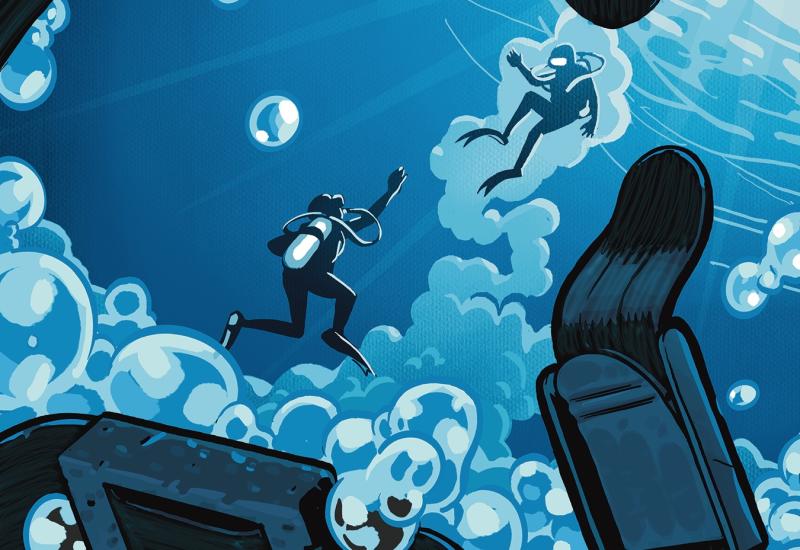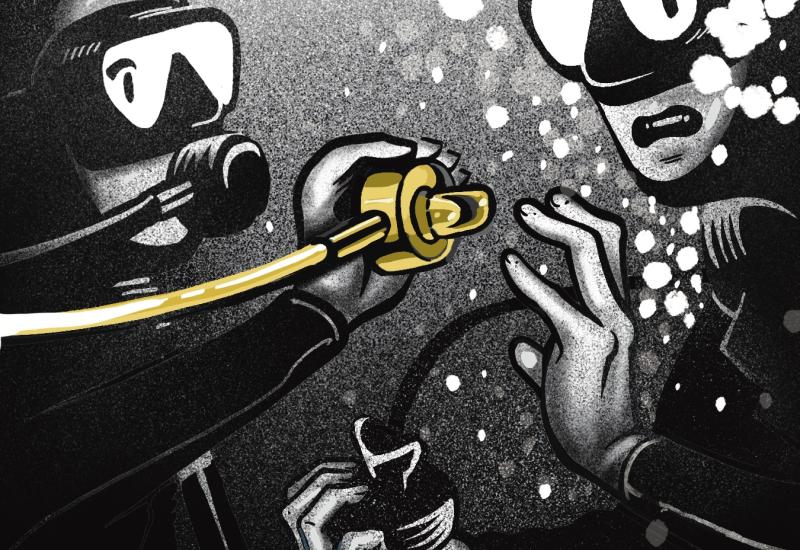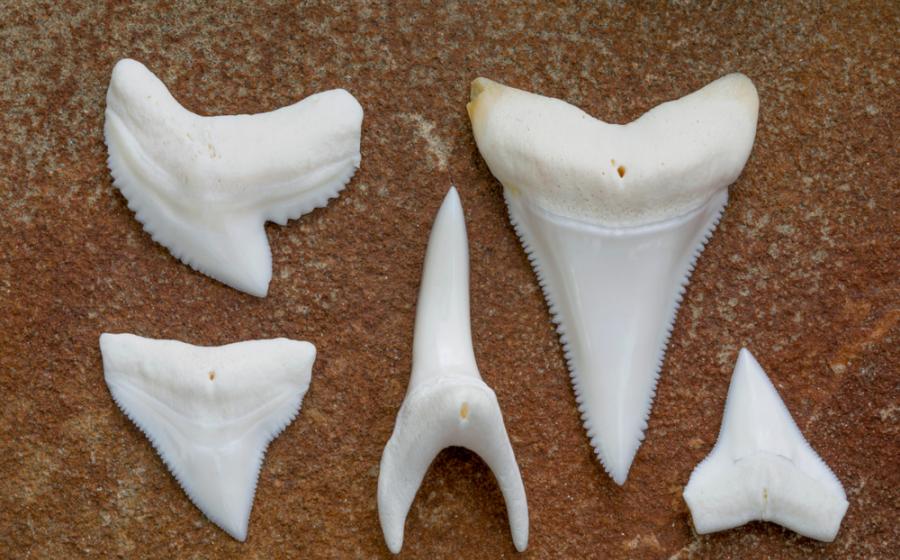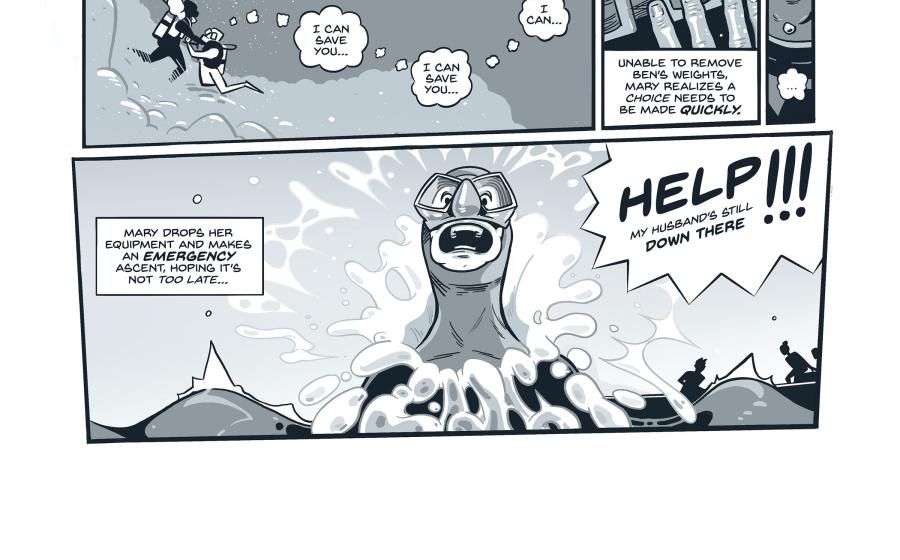4 Reasons Scuba Divers Die

Shutterstock
Pop quiz: An overweight diver in poor physical condition returns to diving after a hiatus of several years. He pulls his old gear off a shelf in the garage, hops on a dive boat and attempts to dive on a current-swept reef at 80 feet. Anxious and struggling for much of the dive, he burns through his air supply at an alarming rate. Upon discovering his tank is nearly empty, the startled diver makes a rapid, barely controlled ascent to the surface and suffers a fatal air embolism. What caused this accident?
You get an A if you answered "all of the above." As this scenario — a composite of the accidents found in the latest annual report of accidents and fatalities from the Divers Alert Network (DAN) — illustrates, fatal dive accidents often have multiple and complex root causes. Dr. Petar Denoble, DAN's research director, puts it this way: "While each accident may be different and some of them occur in an instant, most accidents can be represented as a chain of multiple events that lead to deadly outcome. Removing any link from that chain may change the outcome."
Based on the data contained in The DAN Report, there are four general contributing factors that can lead to fatal dive accidents.
Poor Diver Health
Almost any pre-existing medical condition or health factor can affect a diver's safety. Common examples include obesity, heart disease, high blood pressure, breathing difficulties (temporary or chronic), a general lack of fitness, pre-existing injuries and dehydration. The biggest contributing factor-cited in 74 percent of the fatal cases covered by the study-involved divers with a body mass index in the overweight, obese or morbidly obese categories. And approximately 15 percent of fatalities examined by the study involved people who were known to have high blood pressure or heart disease.
Today, diving is open to people with a host of medical conditions that a few years ago would have prohibited them from participating in the sport. However, if you have one of these conditions, it is important that you have your health regularly monitored and that you manage your medical situation properly. Treated and controlled high blood pressure, for example, may not create nearly the risk factors as uncontrolled high blood pressure.
Temporary health conditions like colds and severe allergies can also be problematic. Whether permanent or temporary, any health condition that impedes your ability to be alert, to recognize and respond to environmental conditions, and otherwise safely plan and complete a dive should contraindicate diving. Even after you recover from your illness or your chronic condition is back in check, your body needs time to recover from the effects of your medical complication. For example: Your cough may be gone, but it may take time for your chest congestion to clear. Rushing into the water before you're physically able to breathe deeply can leave you starved for air, which may lead to panic. In this situation, trying to breathe deeply when the body just is not able to causes you to feel as though you cannot get any air at all. This leads to stress, which can lead to poor decision-making or worse, full-scale panic.
Procedural Errors
Procedural errors common to the accidents covered in the DAN report include buoyancy control problems, rapid ascents, missed decompression stops, general skill limitations, ear equalization problems, and, most critically, failing to properly monitor the air supply, resulting in low-on-air or out-of-air situations. In some cases, the diver lacked the appropriate training for specialized activities like diving in the overhead environment of caves or wrecks or deep diving. In other cases, the diver stayed within the scope of his training, but his emergency response skills simply weren't up to the challenge.
In 26 percent of all the fatalities in the report, an emergency ascent was the precipitating factor leading to the actual cause of death, but there were often other procedural errors that triggered the ascent. Insufficient gas supply was the triggering event in 14 percent of cases; the inability to deal with rough seas and strong current ranked second at 10 percent; followed by health problems at 9 percent; entrapment or entanglement at 9 percent; and equipment problems at 8 percent.
"Three critical words will help any diver be better prepared for dealing with a demanding diving situation: practice, practice, practice," says Dan Orr, former president of DAN and co-author of the book Scuba Diving Safety (see "By the Book" below). "The lack of diving experience or skills or equipment that is unfamiliar adds to the stress of a demanding diving situation and can lead to a task-loading situation resulting in an inappropriate reaction to a situation."
Environmental Issues
Open-water environments can change rapidly, and divers who are unprepared, out of practice or physically incapable of adapting to those changes can become victims.
Before you dive, evaluate the air and water temperatures, currents, wave action, depth and visibility, etc. Not all diving is the same. For example, if you are a warm-water diver making your first cold-water dive, the effects of the water temperature can be a shock to you on your first entry. Shallow-water divers are often surprised by how rapidly they use their air supply and by the impact of narcosis on their first dives in the 100-foot range. Fighting an unexpected current while exploring a wreck is no fun, especially if you lack good buoyancy control, the ability to swim in a streamlined and efficient manner or lack the physical endurance to fight that current.
Equipment Problems
While equipment failures account for relatively few fatalities covered in the DAN study, they are one of the most predictable — and easily preventable — causes of fatal dive accidents. According to the study, BC issues were involved in 7.5 percent of the fatalities; regulator issues in 6 percent; weight systems in 5 percent; and mask, fins, dry suit and computer failures were involved in less than 3 percent each. It is important to note that this does not mean that the equipment failure actually caused the fatality. Ultimately, the diver's reaction to an equipment failure is more likely to impact the outcome of the incident than the actual failure itself.
Equipment issues are often obvious before the dive and the observant diver can effectively make a preemptive self-rescue before he ever enters the water. The best policy is to check your equipment thoroughly before you board the dive boat, maintain your gear carefully and follow all recommended service intervals.
The DAN Report
The DAN Annual Diving Report (formerly called the Annual Report on Decompression Illness, Diving Fatalities, and Project Dive Exploration) is compiled and published annually by the Divers Alert Network, and is available to the public at no cost as a downloadable PDF. Visit www.diversalertnetwork.org for more details.
By the Book
Scuba Diving Safety - Few books cover the topic as broadly as this 185-page paperback from Dan Orr, the former president of the Divers Alert Network, and Eric Douglas, DAN's former training director (and Scuba Diving Lessons For Life columnist). In the spirit of preparation-equals-prevention, it runs the gamut from safe dive site selection to in-water resuscitation, search patterns and the steps for loading an injured diver into a helicopter's rescue basket. Published by: Human Kinetics. See booksbyeric for ordering information.
Don't Be a Statistic — Seven Tips for Avoiding Accidents.
- Dive within the limits of your training. Every year, divers who have never taken a wreck, cave or cavern class die inside cave systems. Nearly as often, divers without proper training die inside the overhead environment of wrecks, too. Get proper training before attempting any dive above your skill level.
- Get the right gear. Whether it's wearing the correct exposure protection for conditions or making sure you have the specialized equipment for a cave penetration, the right gear can make a world of difference. All life-support equipment should be properly maintained, serviced regularly and inspected before every dive.
- Take a refresher course. Even when diving within the limits of your training, take a refresher course to shake off the rust from a long lay-off. A little time spent in the pool before you take that trip-of-a-lifetime vacation will pay big dividends. You'll dive safer and you'll have more fun because you will be more confident.
- Get rescue certified. Every diver should know how to respond in an emergency, but the primary benefit of this class is that it will teach you to be responsible for your own safety.
- Practice safety skills. Practice critical dive skills, such as flooding and clearing your mask, recovering your reg, sharing air, etc.
- Stay in shape for diving. See your doctor about any medical condition that may limit your ability to dive safely. Maintain a level of general fitness so you're prepared to respond to any conditions.
- Stay within your personal safety envelope. Don't make any dive you're not comfortable with. There is nothing wrong with saying no, at least until you have the chance to get the appropriate training.
To read real-life dive accidents and learn how to avoid them click here.
Scuba diver image courtesy of Shutterstock.
Pop quiz: An overweight diver in poor physical condition returns to diving after a hiatus of several years. He pulls his old gear off a shelf in the garage, hops on a dive boat and attempts to dive on a current-swept reef at 80 feet. Anxious and struggling for much of the dive, he burns through his air supply at an alarming rate. Upon discovering his tank is nearly empty, the startled diver makes a rapid, barely controlled ascent to the surface and suffers a fatal air embolism. What caused this accident?
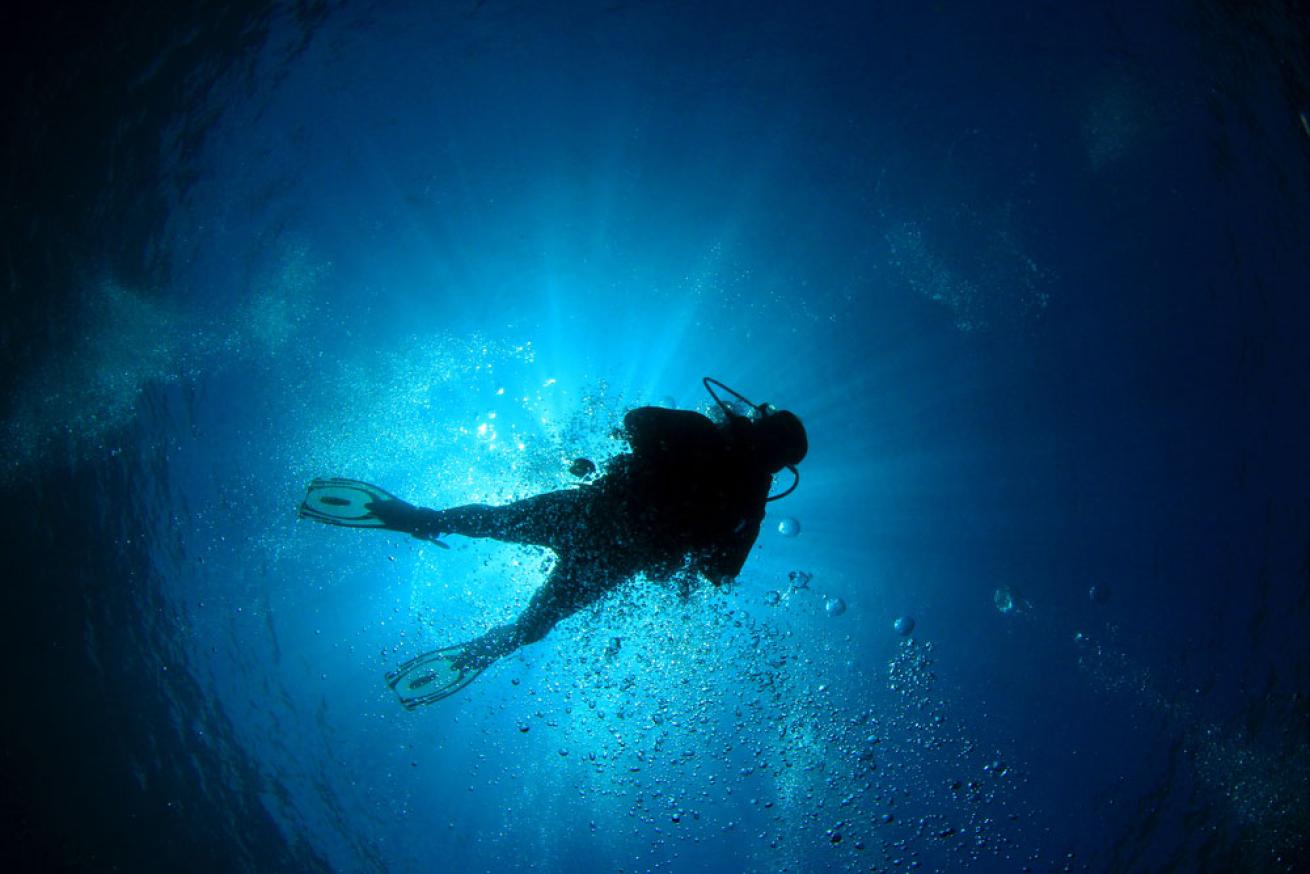
ShutterstockWhy do scuba divers die? There are four general reasons that account for many dive accidents.
You get an A if you answered "all of the above." As this scenario — a composite of the accidents found in one of the annual report of accidents and fatalities from the Divers Alert Network (DAN) — illustrates, fatal dive accidents often have multiple and complex root causes. Dr. Petar Denoble, DAN's research director, puts it this way: "While each accident may be different and some of them occur in an instant, most accidents can be represented as a chain of multiple events that lead to deadly outcome. Removing any link from that chain may change the outcome."
Based on a general look at dive fatalities around the world, there are four general contributing factors that can lead to fatal dive accidents.
Poor Diver Health
Almost any pre-existing medical condition or health factor can affect a diver's safety. Common examples include obesity, heart disease, high blood pressure, breathing difficulties (temporary or chronic), a general lack of fitness, pre-existing injuries and dehydration. The biggest contributing factor involves divers with a body mass index in the overweight, obese or morbidly obese categories.
Today, diving is open to people with a host of medical conditions that a decade or so ago would have prohibited them from participating in the sport. However, if you have one of these conditions, it is important that you have your health regularly monitored and that you manage your medical situation properly. Treated and controlled high blood pressure, for example, may not create nearly the risk factors as uncontrolled high blood pressure.
Temporary health conditions like colds and severe allergies can also be problematic. Whether permanent or temporary, any health condition that impedes your ability to be alert, to recognize and respond to environmental conditions, and otherwise safely plan and complete a dive should contraindicate diving. Even after you recover from your illness or your chronic condition is back in check, your body needs time to recover from the effects of your medical complication. For example: Your cough may be gone, but it may take time for your chest congestion to clear. Rushing into the water before you're physically able to breathe deeply can leave you starved for air, which may lead to panic. In this situation, trying to breathe deeply when the body just is not able to causes you to feel as though you cannot get any air at all. This leads to stress, which can lead to poor decision-making or worse, full-scale panic.
Procedural Errors
Procedural errors common to dive accidents include buoyancy control problems, rapid ascents, missed decompression stops, general skill limitations, ear equalization problems, and, most critically, failing to properly monitor the air supply, resulting in low-on-air or out-of-air situations. In some cases, the diver lacked the appropriate training for specialized activities like diving in the overhead environment of caves or wrecks or deep diving. In other cases, the diver stayed within the scope of his training, but his emergency response skills simply weren't up to the challenge.
"Three critical words will help any diver be better prepared for dealing with a demanding diving situation: practice, practice, practice," says Dan Orr, former president of DAN and co-author of the book Scuba Diving Safety. "The lack of diving experience or skills or equipment that is unfamiliar adds to the stress of a demanding diving situation and can lead to a task-loading situation resulting in an inappropriate reaction to a situation."
Environmental Issues
Open-water environments can change rapidly, and divers who are unprepared, out of practice or physically incapable of adapting to those changes can become victims.
Before you dive, evaluate the air and water temperatures, currents, wave action, depth and visibility, etc. Not all diving is the same. For example, if you are a warm-water diver making your first cold-water dive, the effects of the water temperature can be a shock to you on your first entry. Shallow-water divers are often surprised by how rapidly they use their air supply and by the impact of narcosis on their first dives in the 100-foot range. Fighting an unexpected current while exploring a wreck is no fun, especially if you lack good buoyancy control, the ability to swim in a streamlined and efficient manner or lack the physical endurance to fight that current.
Equipment Problems
While equipment failures account for fewer fatalities than the reasons above, they are one of the most predictable — and easily preventable — causes of fatal dive accidents.
Equipment issues are often obvious before the dive and the observant diver can effectively make a preemptive self-rescue before he ever enters the water. The best policy is to check your equipment thoroughly before you board the dive boat, maintain your gear carefully and follow all recommended service intervals.
The DAN Report
The DAN Annual Diving Report is compiled and published annually by the Divers Alert Network, and is available to the public at no cost as a downloadable PDF.
Don't Be a Statistic — Seven Tips for Avoiding Accidents.
- Dive within the limits of your training. Every year, divers who have never taken a wreck, cave or cavern class die inside cave systems. Nearly as often, divers without proper training die inside the overhead environment of wrecks, too. Get proper training before attempting any dive above your skill level.
- Get the right gear. Whether it's wearing the correct exposure protection for conditions or making sure you have the specialized equipment for a cave penetration, the right gear can make a world of difference. All life-support equipment should be properly maintained, serviced regularly and inspected before every dive.
- Take a refresher course. Even when diving within the limits of your training, take a refresher course to shake off the rust from a long lay-off. A little time spent in the pool before you take that trip-of-a-lifetime vacation will pay big dividends. You'll dive safer and you'll have more fun because you will be more confident.
- Get rescue certified. Every diver should know how to respond in an emergency, but the primary benefit of this class is that it will teach you to be responsible for your own safety.
- Practice safety skills. Practice critical dive skills, such as flooding and clearing your mask, recovering your reg, sharing air, etc.
- Stay in shape for diving. See your doctor about any medical condition that may limit your ability to dive safely. Maintain a level of general fitness so you're prepared to respond to any conditions.
- Stay within your personal safety envelope. Don't make any dive you're not comfortable with. There is nothing wrong with saying no, at least until you have the chance to get the appropriate training.
To read real-life dive accidents and learn how to avoid them click here.



